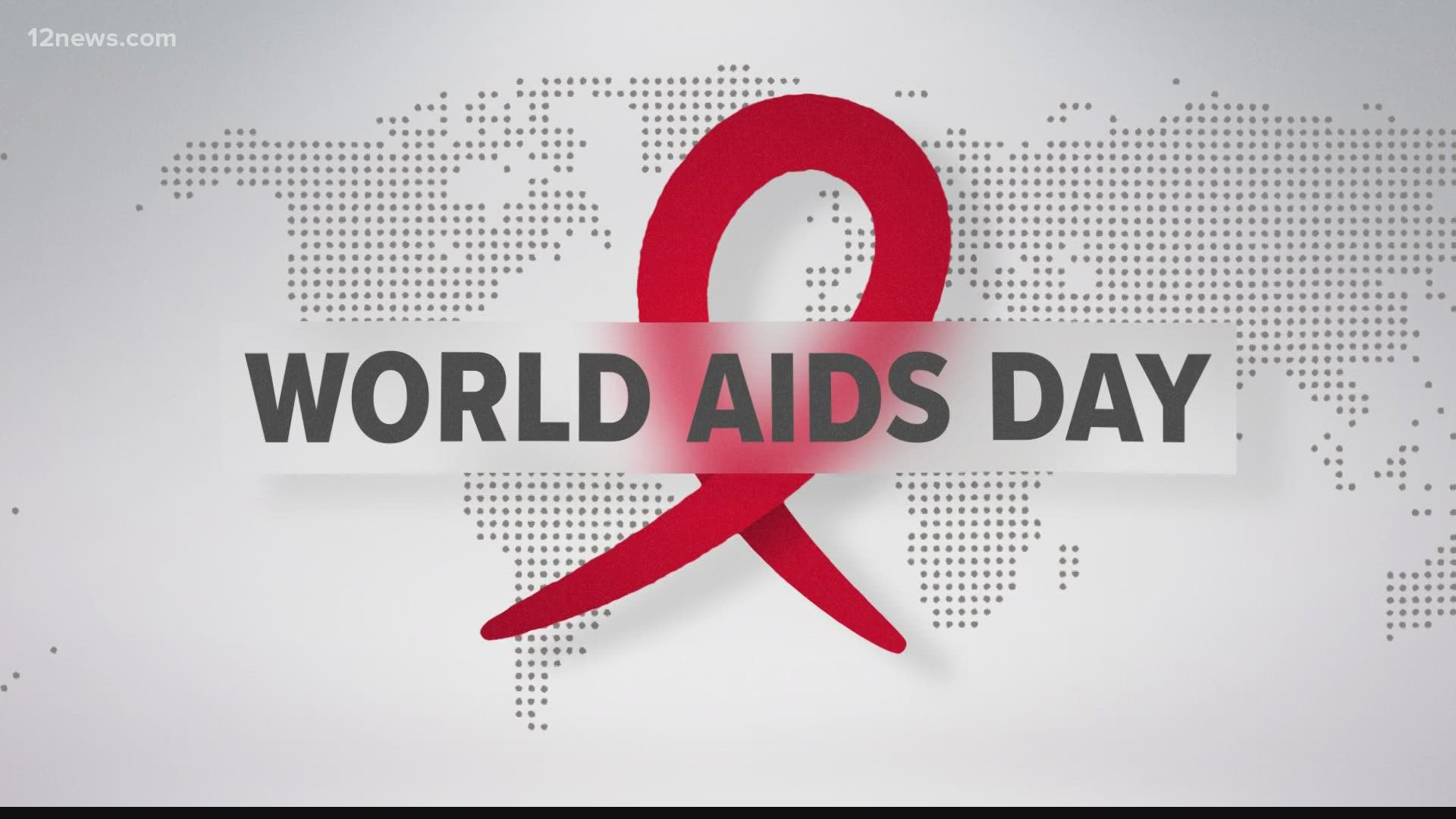PHOENIX — For 33 years, Dec. 1 has been recognized as World AIDS Day to show support for the millions of people living with HIV and to honor the 36 million people who have died from HIV-related illness since it was first reported in June 1981.
Inside the Parsons Center for Health and Wellness in downtown Phoenix Peter Rodriguez and others from organizations like the Aunt Rita's Foundation and the Southwest Center for HIV/AIDS are preparing for an annual quilt ceremony to remember those lost.
“I’ve been doing this for 8 years bringing the quilts in and it’s like having old friends coming to visit,” said Peter.
Two of the quilts are for Peter's partner Paul and chosen "gay father" Jeff.
“He (Paul) had PML which is lesions on the brain," said Peter. "At that point, he lost most of his faculties. So, I really mourned him two years prior to his death. Then my gay dad Jeff who took me in as a runaway, he passed away two weeks after Paul did.”
Peter has lived with HIV for nearly 40 years. The evolution of medical cocktails and decades of research allow him and others to live with a disease that was once considered a death sentence.
"For me, it's a celebration because it's a second chance for life," said Peter. "For a long time, I took it day by day and never planned for the future because I never thought I'd be here."
There is no cure for AIDS but there are treatments that allow people living with HIV to be undetectable and not pass it on to their partners.
HIV research serves as a blueprint for the fight against COVID-19
Scientists at the Mayo Clinic said that HIV/AIDS research has served as a foundation for researching COVID-19.
Although COVID-19 vaccines were developed within two years since the start of the pandemic, a vaccine for HIV is still a work in progress.
Dr. Andrew Badley, director of the HIV Immunology Laboratory at Mayo Clinic, said there are different challenges between the viruses, including the time between mutations of HIV.
"There are really two kinds of vaccines that we can talk about. One is a vaccine to prevent infection. Because HIV can infect cells through multiple different receptors, no vaccine has yet proven successful in preventing infections in humans," said Dr. Badley. "The other kind of vaccine is designed to treat the infection. In the setting of treating infection, because HIV targets the same immune cells that respond to the vaccine, by the time you get an infection, it wipes out your ability to respond to that vaccine.
Dr. Badley said there is a second challenge for a therapeutic vaccine is that like every virus including SARS-CoV-2 (the virus that causes COVID-19), the virus evolves over time.
There are "countless different strains of HIV floating around within an individual patient. So far, we've been unable to come up with a vaccine that is protective against all of them. That's why a therapeutic vaccine doesn't work today," said Badley.
“How to make drugs, how to make vaccines, how to treat virus infections. All of those advances were made because of HIV research, and we are reaping the rewards both in HIV very treatable disease today but also in the SARS-COV-2 and the pandemic,” said Badley.
While COVID-19 has benefited from HIV research, responses to the viruses were very different
“It was easy to say that it was a gay cancer back then because that meant only 5% of the population was at risk,” said Jimmy Thomason, executive director for the Aunt Rita's Foundation in downtown Phoenix.
The foundation has sought to end HIV in Arizona since 2005 with history in the Valley dating back to the 1980s. It provides a myriad of programs including advocating at the Arizona legislature and state government to develop laws and policies to educate, prevent and treat HIV.
"We offer free at-home HIV testing," said Thomason.
Thomason was diagnosed with HIV in 2005 but said, unlike COVID-19, AIDS was initially looked at as a social issue by the majority of government and medical officials as a virus that targeted gay men for their transgressions.
“It took so long for people to finally pay attention," said Thomason. "We’ve seen so many variants of COVID-19 already. Consider 40 years of those variants over the course of time so creating a vaccine for HIV is very complicated.
Both Peter and Jimmy hope the blueprint HIV has given will one day soon lead to scientists finding a cure for HIV which impacts everyone.
“It is time to take full action and pay full attention to HIV and AIDS," said Thomason.
Resources for HIV/AIDS:
Up to Speed
Catch up on the latest news and stories on the 12 News YouTube channel. Subscribe today.

